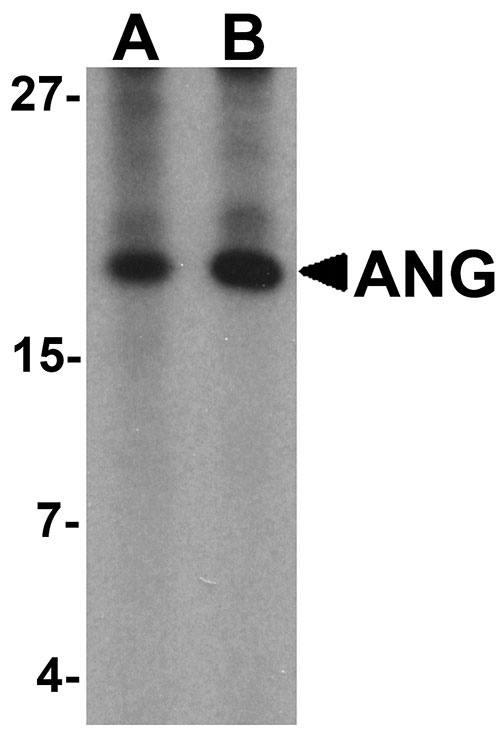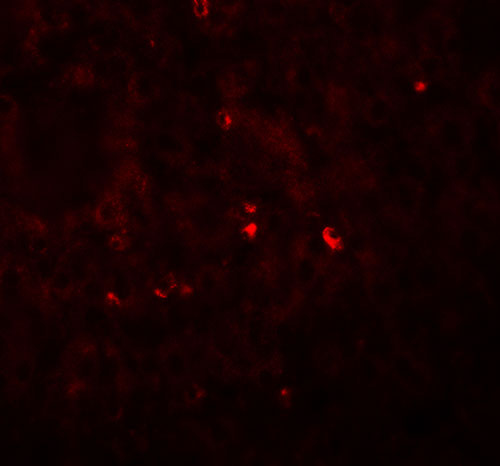ANG Antibody
- SPECIFICATION
- CITATIONS
- PROTOCOLS
- BACKGROUND

Application
| WB, IF, E |
|---|---|
| Primary Accession | P03950 |
| Other Accession | NP_001136, 4557313 |
| Reactivity | Human, Mouse, Rat |
| Host | Rabbit |
| Clonality | Polyclonal |
| Isotype | IgG |
| Calculated MW | 16 kDa |
| Application Notes | ANG antibody can be used for detection of ANG by Western blot at 1 - 2 µg/mL. For immunofluorescence start at 20 µg/mL. |
| Gene ID | 283 |
|---|---|
| Target/Specificity | ANG; Two alternatively spliced transcript variants have been observed. |
| Reconstitution & Storage | ANG antibody can be stored at 4℃ for three months and -20℃, stable for up to one year. As with all antibodies care should be taken to avoid repeated freeze thaw cycles. Antibodies should not be exposed to prolonged high temperatures. |
| Precautions | ANG Antibody is for research use only and not for use in diagnostic or therapeutic procedures. |
| Name | ANG |
|---|---|
| Synonyms | RNASE5 |
| Function | Ribonuclease that cleaves tRNA within anticodon loops to produce tRNA-derived stress-induced fragments (tiRNAs) which inhibit protein synthesis and triggers the assembly of stress granules (SGs) (PubMed:1400510, PubMed:21855800). Binds to actin on the surface of endothelial cells; once bound, angiogenin is endocytosed and translocated to the nucleus (PubMed:8127865). Stimulates ribosomal RNA synthesis including that containing the initiation site sequences of 45S rRNA (PubMed:12051708). Angiogenin induces vascularization of normal and malignant tissues (PubMed:19354288). Angiogenic activity is regulated by interaction with RNH1 in vivo (PubMed:19354288). |
| Cellular Location | Cytoplasmic vesicle, secretory vesicle lumen {ECO:0000250|UniProtKB:Q3TMQ6}. Secreted {ECO:0000250|UniProtKB:P10152}. Nucleus. Nucleus, nucleolus. Note=Rapidly endocytosed by target cells and translocated to the nucleus where it accumulates in the nucleolus and binds to DNA (PubMed:12051708) |
| Tissue Location | Expressed predominantly in the liver. Also detected in endothelial cells and spinal cord neurons |

Thousands of laboratories across the world have published research that depended on the performance of antibodies from Abcepta to advance their research. Check out links to articles that cite our products in major peer-reviewed journals, organized by research category.
info@abcepta.com, and receive a free "I Love Antibodies" mug.
Provided below are standard protocols that you may find useful for product applications.
Background
ANG Antibody: Angiogenin (ANG or ANG I) is important for the process of neovascularization and formation of new blood vessels. ANG is similar to pancreatic ribonuclease A and functions as a tRNA-specific ribonuclease that abolishes protein synthesis by specifically hydrolyzing cellular tRNAs. It interacts with endothelial cell-surface actin and may cause changes in the cell cytoskeleton. ANG is thought to be involved in the development of solid tumors and its antagonists are capable of inhibiting tumor growth. Defects in ANG are the cause of susceptibility to amyotrophic lateral sclerosis type 9 (ALS9). Angiogenin is a genetic link between ALS and PD.
References
Moroianu J and Riordan JF. Identification of the nucleolar targeting signal of human angiogenin. Biochem. Biophys. Res. Commun. 1994; 203:1765-72.
Hu G, Riordan JF, and Vallee BL. Angiogenin promotes invasiveness of cultured endothelial cells by stimulation of cell-associated proteolytic activities. Proc. Natl. Acad. Sci. USA 1994; 91:12096-100.
Pyatibratov MG and Kostyukova AS. New insights into the role of angiogenin in actin polymerization. Int. Rev. Cell. Mol. Biol. 2012; 295:175-98.
Li S, Ibaragi S, and Hu GF. Angiogenin as a molecular target for the treatment of prostate cancer. Curr. Cancer Ther. Rev. 2011; 7:83-90.
If you have used an Abcepta product and would like to share how it has performed, please click on the "Submit Review" button and provide the requested information. Our staff will examine and post your review and contact you if needed.
If you have any additional inquiries please email technical services at tech@abcepta.com.













 Foundational characteristics of cancer include proliferation, angiogenesis, migration, evasion of apoptosis, and cellular immortality. Find key markers for these cellular processes and antibodies to detect them.
Foundational characteristics of cancer include proliferation, angiogenesis, migration, evasion of apoptosis, and cellular immortality. Find key markers for these cellular processes and antibodies to detect them. The SUMOplot™ Analysis Program predicts and scores sumoylation sites in your protein. SUMOylation is a post-translational modification involved in various cellular processes, such as nuclear-cytosolic transport, transcriptional regulation, apoptosis, protein stability, response to stress, and progression through the cell cycle.
The SUMOplot™ Analysis Program predicts and scores sumoylation sites in your protein. SUMOylation is a post-translational modification involved in various cellular processes, such as nuclear-cytosolic transport, transcriptional regulation, apoptosis, protein stability, response to stress, and progression through the cell cycle. The Autophagy Receptor Motif Plotter predicts and scores autophagy receptor binding sites in your protein. Identifying proteins connected to this pathway is critical to understanding the role of autophagy in physiological as well as pathological processes such as development, differentiation, neurodegenerative diseases, stress, infection, and cancer.
The Autophagy Receptor Motif Plotter predicts and scores autophagy receptor binding sites in your protein. Identifying proteins connected to this pathway is critical to understanding the role of autophagy in physiological as well as pathological processes such as development, differentiation, neurodegenerative diseases, stress, infection, and cancer.



